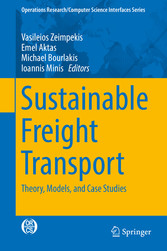Suche
Lesesoftware
Specials
Info / Kontakt
Sustainable Freight Transport - Theory, Models, and Case Studies
von: Vasileios Zeimpekis, Emel Aktas, Michael Bourlakis, Ioannis Minis
Springer-Verlag, 2018
ISBN: 9783319629179 , 178 Seiten
Format: PDF, Online Lesen
Kopierschutz: Wasserzeichen




Preis: 117,69 EUR
eBook anfordern 
Contents
5
Introduction
7
References
11
Logistics and Freight Transport as the Kernel of Resilient Airport-Driven Development; A Survey on Basic Interactivities and Causalities
12
1 Airport Operations: On Course for Growth
13
2 Airport-Driven Development: An Integrated Planning Framework
15
2.1 Causality Between Airport and Economic Development
16
2.2 Airport-Driven Development Concepts
17
3 Complexity of Freight Transport and Logistics: A Challenge in Integrated Planning
19
4 Airport-Driven Development Encompasses More Than Air Freight
21
4.1 Value of Air Transport to Logistics
22
4.2 Stimulated Logistics Activities in Airport-Driven Development
23
5 Simple Prevailing Loop: Complicated Underlying Dynamics
26
6 Causalities Within the Airport-Driven Development
27
6.1 Productive Interactions
28
6.2 Counterproductive Interactions
29
7 Final Discussion
30
References
31
Sustainability Management in Smaller UK Ports to Promote More Sustainable Freight Transport
35
1 Sustainability Management, Freight Performance and Ports
35
2 Examples of Port Sustainability Management
38
2.1 Port Masterplanning
38
2.2 Sustainability Reporting
38
2.3 Exemplary Sustainability Practice: Container Megaports
39
2.4 EMS in Ports
39
2.5 PSMS and Smaller UK Ports
41
3 How Might Sustainability Management Permeate the UK Ports Industry?
42
3.1 Potential Drivers of Sustainability Awareness in Smaller UK Ports
42
3.2 Internal Strategies to Embed Sustainability Management
43
3.3 Supply Chain and Other Sectoral Pressures
44
3.4 Pragmatism and Requirements to Safeguard Critical Revenue Streams
45
3.5 Towards an Implementation Strategy
46
References
47
A Bi-objective Problem of Scheduling Fuel Supply Vessels
51
1 Introduction: Problem Definition
52
1.1 Introduction
52
1.2 Problem Definition
53
2 Problem's Mathematical Formulation
57
2.1 Notation
58
Sets
58
Indices
58
Parameters
58
Variables
58
3 Solution Methodology
59
4 Empirical Evaluation
60
5 Conclusions
63
References
64
Web References
65
Value Creation Through Green Vehicle Routing
66
1 Introduction
66
2 Negative Externalities of Road Transportation
67
3 Models and Calculators for Estimating Emissions
69
3.1 Macroscopic Models
69
3.2 Microscopic Models
70
3.3 Online Tools and Calculators
72
4 Green Vehicle Routing Problems
73
4.1 The Pollution-Routing Problem
73
4.2 The Homogeneous and Heterogeneous Emissions VRP
76
4.3 The Energy-Minimizing VRP
77
4.4 The VRP with Fuel Consumption Rate
77
5 Conclusions
78
References
79
Environmental Benefits of Collaboration and Allocation of Emissions in Road Freight Transportation
82
1 Introduction
82
2 Environmental Benefits of Collaborative Transportation
83
2.1 Reducing Emissions
84
2.2 Improving Transport of Biomass
87
3 Emission Allocation
87
3.1 Cooperative Game Theory Concepts
88
3.2 Allocation Methods
89
3.3 Example
90
3.3.1 Min Cost Problem
90
3.3.2 Min Emission Problem
93
3.3.3 Results
94
3.4 Applications
95
4 Quantifying the Inputs
97
4.1 Calculating Emissions
97
4.2 Optimization Criteria
98
5 Conclusions
98
References
100
Short Supply Chains as a Viable Alternative for the Distribution of Food in Urban Areas? Investigation of the Performance of Several Distribution Schemes
102
1 Introduction
103
2 Identification of Distribution Models for Short Food Supply Chains in Urban Areas
105
3 Direct Distribution
105
4 Horizontal Collaboration
106
5 Direct Distribution Through a Logistics Service Provider (LSP)
107
6 Modelling the Environmental and Economic Performance of Different Distribution Schemes for Short Food Supply Chains
109
6.1 Overall Modeling Approach
109
6.2 Notations
111
Indices and sets
111
Parametres
111
6.3 Scheme I: Direct Distribution from the Producers to the Customers
112
6.4 Scheme II: Co-Loading Between Producers
113
6.5 Scenario III: Delivery Through a Logistics Service Provider
114
7 Application to the Brussels Capital Region
116
8 Results
117
9 Policy, Societal and Managerial Implications
119
10 Conclusion
120
References
120
Sustainable Solutions for Urban Freight Transport and Logistics: An Analysis of Urban Consolidation Centers
123
1 Introduction
123
2 Urban Freight Consolidation Centers (UCCs)
124
3 Benefits and Limitations of UCCs in Europe
126
3.1 UCCs Schemes in Europe: A Critical Review
126
3.2 The Nijmegen's Consolidation Center: Binnenstadservice.nl
127
3.3 The Parma's Consolidation Center: Ecocity
128
4 Stakeholders' Commitment: Integration and Collaboration for a Successful Implementation of Sustainable Urban Freight Schemes
130
5 The Receivers and Their Key Role in the Urban Freight Context
132
6 A Successful Example of UCC: The Bristol and Bath Urban Freight Consolidation Center (BBUCC)
133
6.1 Description of the BBUCC Scheme
133
6.2 Costs
133
6.3 Pricing Scheme
134
7 Estimation of the Sustainability Improvement Due to BBUCC
135
8 Investigating the Point of View of the Receivers
135
9 Conclusion
136
10 Direction of the Future Research
137
References
137
Urban Vehicle Access Regulations
140
1 Introduction
140
2 Urban Vehicle Access Regulations
143
2.1 Access Time
143
2.2 Vehicle Characteristics
144
2.3 Load Factors
144
3 Preferred UVAR Schemes
145
3.1 Low Emission Zones
145
3.1.1 LEZ Best Practices
145
3.1.2 LEZ Impacts
147
3.1.3 LEZ Enforcement
148
3.1.4 LEZ Stakeholder Involvement
149
3.2 Congestion Charging
150
3.2.1 CC Best Practices
150
3.2.2 CC Impacts
151
3.2.3 CC Enforcement
152
3.2.4 CC Stakeholder Involvement
152
3.3 Combining Low Emission Zones and Congestion Charging
154
3.4 Choosing an UVAR Scheme
154
4 Preferred Solutions
154
4.1 Urban Consolidation Centres
155
4.1.1 UCC Best Practices
155
4.1.2 UCC Impacts
156
4.1.3 UCC Implementation
157
4.1.4 UCC Stakeholder Involvement
157
4.2 Cargo Bikes
158
4.2.1 CB Best Practices
158
4.2.2 CB Implementation
158
4.2.3 CB Impacts
159
4.3 Off-Hour Delivery
159
4.3.1 OHD Best Practices
159
4.3.2 OHD Impacts
160
4.3.3 OHD Implementation
160
4.3.4 OHD Stakeholder Involvement
161
5 Conclusions
161
References
162
The Importance of Supplier Development for Sustainability
165
1 Introduction
166
2 Sustainable Supply Chain Management (SSCM)
167
3 Supplier Development
168
3.1 Environmental Supplier Development (ESD)
169
3.2 Activities of Supplier Development
171
3.3 Barriers to Supplier Development
173
4 Conclusion
174
References
175







